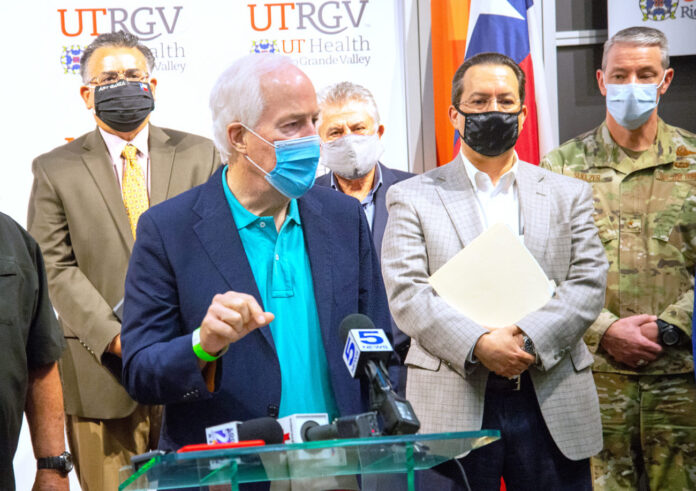HARLINGEN — Sen. John Cornyn told Rio Grande Valley leaders Tuesday he would work to continue pushing for federal dollars to fund the area’s healthcare and education systems until the coronavirus crisis becomes “manageable.”
During an hour-long roundtable discussion, the Valley’s county judges and hospital administrators called on Texas’ senior Republican senator to push for continued funding under the Coronavirus Aid Relief and Economic Security Act, or CARES.
So far, he’s helped pump $97 million into the Valley’s healthcare system and millions more into areas such as education, Cornyn said.
“I’m proud to be part of the federal response,” Cornyn said at the University of Texas Rio Grande Valley’s Clinical Education Building, referring to CARES funding. “You’re not fighting this fight alone. Together we will get through this. We would like to make sure (funds) are not withdrawn until we’re in a manageable situation.”
Few patients at recovery center
During a short press conference, a reporter told Cornyn the state’s projects to convert the McAllen Convention Center and Harlingen’s Casa de Amistad into Texas’ biggest COVID-19 recovery centers had led to few hospital transfers.
Last month, Gov. Greg Abbott announced plans to use CARES funding to convert
the two convention centers into COVID-19 recovery units to help free beds in hospitals that had reached capacity amid a surge of new cases.
Now, as the number of new COVID-19 patients has begun dropping, hospitals have been able to free more beds for victims of trauma and other critical patients.
On Tuesday morning, the McAllen facility, equipped with as many as 250 beds, was treating six recovered COVID-19 patients.
Since the recovery center opened Aug. 4, Hidalgo County hospitals have transferred eight patients to the facility.
In Harlingen, the recovery center at Casa de Amistad, equipped with as many as 96 beds, hadn’t opened as of Tuesday morning, as local officials waited to finalize documents related to hospital licensing.
In response to the few patients hospitals have transferred to the McAllen facility, Cornyn said the recovery center would stand ready in case of a spike in new COVID-19 patients.
“The big concern was we were overwhelming the hospitals,” Cornyn told reporters. “The fact that they are not widely needed is good but they’re there in case they are needed.”
Cornyn also told reporters he would continue to push for funding to connect more households to the internet as Texas schools prepare to open with on-line learning.
“Our children have to work on-line,” he said, adding he’s pushed for billions of dollars to gap the so-called digital divide. “Access to broadband is absolutely essential.”
Call for more CARES funding
During the roundtable discussion, Valley leaders pointed to key issues such as lack of medical resources to treat an underserved population in one of the poorest areas in the United States.
In the last month, Cameron County’s number of positive COVID-19 cases surged, County Judge Eddie Treviño Jr. told Cornyn.
While the county’s total case count stood at 3,496 on July 10, he said, cases soared to 16,906 on Monday.
During that period, the county’s death toll climbed from 77 to 378, he said.
“It’s terrible,” Treviño said. “It dictates a personal failure for everyone who lost their life.”
Now, he’s concerned lower numbers of new cases could lead residents to let down their guard in the fight against the virus.
“I don’t want the public to think we’re past this pandemic,” Treviño said.
So far, he said, the CARES Act has pumped $5.5 million into the county.
But the county needs more money to continue dealing with the crisis, Treviño said.
“We are in dire need,” he said.
Call for early COVID-19 treatment
Hidalgo County Judge Richard F. Cortez called for better access to medical care to help stem his county’s high numbers of cases.
“It’s a disaster,” he told Cornyn. “We cannot continue in this path.”
Cortez called for quicker test results and in-home testing, while pushing for isolation of COVID-19-infected residents living in multi-generational households.
“We have so many people in poverty, so many people without medical care, they wait too long to be treated,” he said. “We have to do something about getting patients to the hospital for treatment earlier.”
Like Cortez, Willacy County Judge Aurelio Guerra warned school’s classroom instruction could spike cases.
“Face-to-face instruction would be a disaster for us,” Guerra told Cornyn, adding school districts are Willacy County’s biggest employers.





